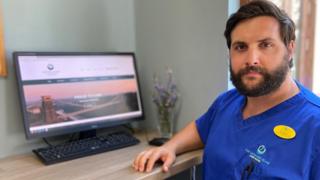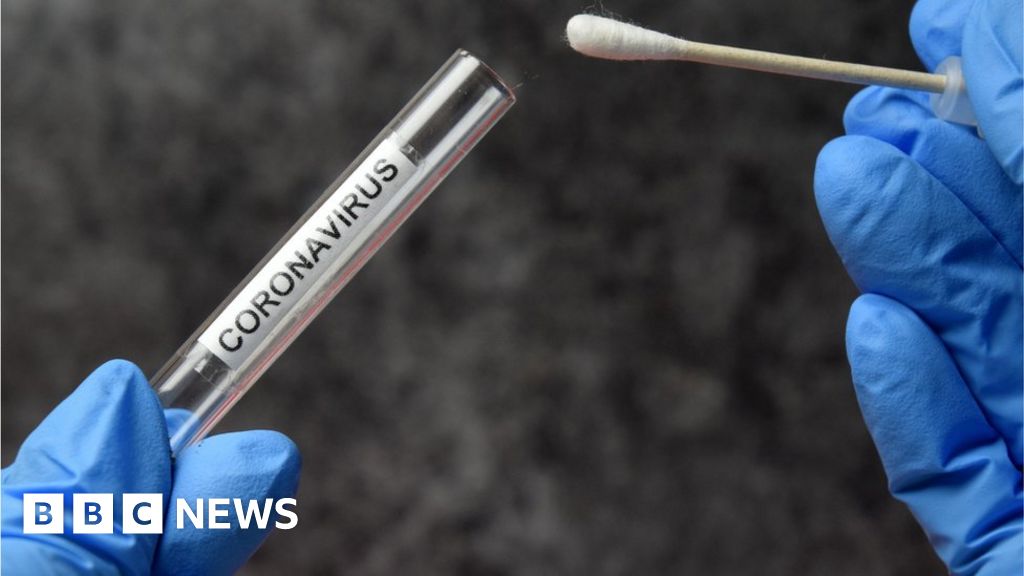 Image copyright
Optima Care
Image caption
Ed Bliss said two people died within the first hour of him arriving at the home
Image copyright
Optima Care
Image caption
Ed Bliss said two people died within the first hour of him arriving at the home
Care homes across England have tried in vain to protect their vulnerable from Covid-19 but the virus has swept through many, contributing to thousands of deaths and causing a widespread crisis over the way it has been handled. One care home boss describes the reality of trying to stop the virus once it got through the doors.
"It was so unprecedented and such uncharted territory - things were just changing so quickly. The first day I went in, within the first hour, there were two deaths.
"You had people walking around that do not have the capacity or insight to understand that walking around could potentially kill themselves or infect another resident."
Less than two weeks into the national lockdown, Ed Bliss learned that residents and staff at his family-run care homes in Devon were showing possible signs of Covid-19.
Primley Court and Primley View in Paignton had closed their doors to visitors and relatives two weeks before the prime minister's announcement on 23 March. But by the first week of April, several residents at both premises, which have 100 staff and care for up to 80 people with dementia, were seriously unwell, and the entire senior team was ill or self-isolating.
"[Primley Court] was hit so quickly, the staff had been wiped out," said Ed. "Our top five senior staff members were taken out of the game, so we had lost our rudder.
"We had 40% of our workforce out on the floor either ill or self-isolating, so we were running a home at near full capacity with complex dementia care needs with 60% of our own staff and limited senior management."
Image copyright Optima Care Image caption Primley Court and Primley View were both hit by the virusOptima Care Partnership was started by Ed's father, Paul, 34 years ago and remains a family-run business based in Weston-super-Mare. It cares for people with varying types of dementia and those who need psychiatric rehabilitation or end-of-life nursing at homes in Bristol, North Somerset and Devon.
The first coronavirus symptoms were seen at the Paignton homes on 3 April and a small number of residents were tested five days later. The results, which came back on 11 April, showed some of those tested were positive for the virus.
Management at the homes raised concerns two days later about the number of residents becoming lethargic with no fever with the Torbay Council Quality Assurance and Improvement Team (QAIT) and Public Health England (PHE), and insisted more residents needed to be swabbed.
But Ed, who is director of dementia services, said a consultant at PHE told them lethargy was not a symptom of the virus and further testing was unnecessary.
"We were saying 'we need help here' and we weren't getting that as readily as we wanted. While understanding that it was just wildly unprecedented, that is where the hole was," he said.
"The social care sector was being treated as second class to the NHS. Second week into lockdown there was nothing, no focus on social care. That's when they should have been in, at that point, and that's where it fell down."
Image copyright Getty ImagesThe situation was escalated by QAIT and on 18 April all residents and staff were tested for the virus. With the situation becoming critical following a number of deaths, a specialist team from Torbay Hospital was called in to help. Ed, his nephew and sister-in-law, all of whom are nurses, joined them soon after.
"We knew [staff] were really struggling and we had to do something," said Ed, who normally works in a home near Bristol. "We were told by the NHS infection control team, 'you have a high risk of getting this'. That was just something we were prepared to accept."
To combat the spread of the virus, floors were isolated and staff worked on one site to reduce the risk of cross infection. The changes made those residents with complex dementia more agitated, with some becoming violent and spitting - a particular risk when trying to stop the spread of the virus.
For residents showing coronavirus symptoms, official advice was to keep them in their rooms, but Ed said this was "impossible".
"You have to imagine - residents are coming out of their rooms that we're desperately trying to keep in their rooms, but we can't keep them in there because of the distress that would cause and varying care policies.
"That is what we were constantly up against. It's indescribable, because you're in the middle of it, you're in the middle of danger."
How big is the epidemic in care homes?
Asymptomatic care workers unknowingly spread virus
Care homes felt 'abandoned' as virus hit
Many of the staff brought in to help had no experience of working in a care home setting or how to provide dementia care at a complex level. Staff were also faced with the challenge of trying to care for people, many of whom have communication difficulties, while dressed head to toe in protective clothing, or PPE.
"Half your face is covered, you have plastic all over you, gloves on and the only thing you can really communicate [with] is this muffled voice and your eyes," said Ed.
By far one of the hardest things to manage was the impact on families who lost relatives, said Ed.
"Making the call to say 'mum is close now', that was very difficult, very alien. To have that kind of emotional phone call… you can't hold someone's hand, they can't see how genuinely upset you are about what you are saying to them.
"To have that conversation with someone over the phone is not what we are here to do, but that is all we had. Someone telling you that you can't see your mum or dad, knowing they are probably going to die within the next 24 hours… to take that away from the families is disastrous. You just can't understand how crushing that is."
Image copyright Optima Care Image caption The care homes have since been given the all-clear by Public Health EnglandBy the end of April the outbreak at both homes had stabilised and they have since been given the all-clear by PHE. Despite the challenges they faced, Ed said support from the Care Quality Commission, PHE and local authorities had been "excellent" during an incredibly difficult time.
"We would have wanted to see more support within that initial two-week gap, more testing and resource, we didn't get it," he said.
"But we did as best we could and... the NHS professional disciplinary teams did as best they could as well."
A spokeswoman for PHE said: "PHE South West, Torbay Council and Torbay and South Devon NHS Foundation Trust worked in partnership to support the care home, following the government guidance on managing an outbreak.
"Further testing of residents, asymptomatic, symptomatic or otherwise, was not part of government guidance at the time.
"However, to provide extra support to the home, testing of all residents and also staff was promptly carried out by the local hospital laboratory alongside a full support package provided by the local hospital."
Optima Care Partnership has not released official figures for the number of staff and residents affected, or the number of deaths. It said it could not conclusively say when or how the virus got into its homes.

 5 years ago
885
5 years ago
885 

